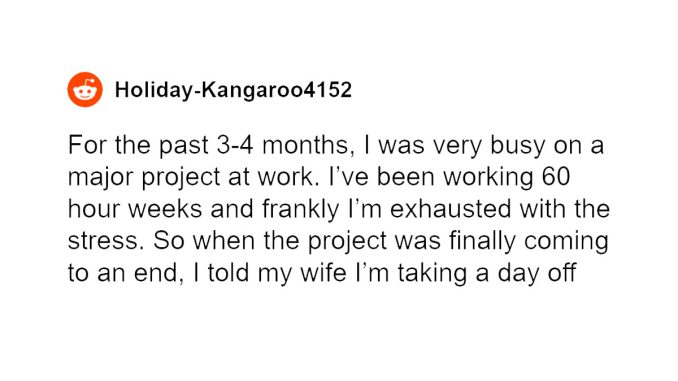
Every parent needs a break once in a while. The bigger part of their day revolves around taking care of someone else, and the all-consuming tasks can quickly become emotionally and physically exhausting. Time off helps them refill their cups and be a better parent for their children.
After working intense 60-hour weeks and balancing parenthood, redditor Holiday-Kangaroo4152 was long overdue for a day to himself. So he informed his wife he would be taking a brief break and asked her not to assign childcare or any chores to him. However, on the day, she ‘forgot’ about it, majorly getting under the husband’s skin.
Every parent needs a break once in a while. However, this can be impossible without the support of significant other
Image credits: Keira Burton (not the actual photo)
This husband found himself not being able to have even one day off because his wife refused to free him from housework
Image credits: RDNE Stock project (not the actual photo)
Image source: Holiday-Kangaroo4152
66% of parents around the world suffer from burnout
In the last few years, more than 66% of parents have suffered from burnout, thanks to the pandemic. A 42-country study has found that parents in the United States are feeling the most exhausted. While paid parental leave and aid for childcare would help to take things off parent’s plates, making sure to take care of themselves should be more of a priority.
A psychologist, Jeff Temple, uses the oxygen mask analogy to explain why it’s essential that parents take a mental health break. “If you run out of oxygen, you’re of no use to your fellow passengers,” he says. “Same holds true for parenting. If you don’t take care of yourself, you’ll be a less effective parent and more prone to burnout and lashing out.”
Nowadays, it’s also common for parents to juggle more things than they can realistically manage. Between work, caregiving, carpooling, and volunteering, they give so much to others that they often fail to focus on themselves.
“When parents don’t take breaks and prioritize self-care, they run the risk of failing to accomplish their biggest goal: raising healthy, happy kids,” says Temple. “Even the calmest, most well-intentioned parent has a threshold that, without breaks, will be breached.”
Parents are advised to take one mental health break per day, even if only for 30 minutes
How this break looks may depend on the individual. One person might need to leave home and catch some fresh air outside, while the other may feel content going to a different room and meditating or listening to relaxing music. The focus should be not on when and how long the activity is, but on how it makes one feel. If the person is left refreshed and rejuvenated after, it can count as a mental health break. If not, there are plenty of different things to try. Remember, everyone’s needs are different, and understanding your individual ones is key.
For parents who like concrete numbers, Temple recommends taking one break per day, even if only for 30 minutes. However, the duration and frequency can vary depending on the number of children, their temperament, support systems, and other life stressors. During days when parents don’t have the luxury of allocating half an hour for themselves, Stuart Lustig, a child psychiatrist, suggests taking microbreaks. A few minutes outside, drinking a cup of coffee, or journaling can make all the difference and provide a moment to reset.
In order to get the most out of your rest, Lustig recommends setting boundaries with the family when a parent is planning on taking some time off and making sure that everyone realizes they are unavailable during a certain period. This usually means hiring a babysitter or asking a partner or relatives for extra help. Being open with the kids about the importance of mental health is also likely to be mimicked when they get older, fostering care for the upcoming generation’s emotional well-being.
A budget-friendly idea for a self-care activity that experts suggest is spending time in nature, which can be very healing and, luckily, very inexpensive. “A long hike or walk can often make a big difference. Just make sure to really pay attention to what’s around you!” says Lustig. Going to the gym or firing up a YouTube workout video in your living room can also be great for your mental health. Some additional occupations include free entertainment like checking a book from a library, listening to a podcast, and allocating some time to significant other and friends.
The author provided more information in the comments
Some readers supported the husband
Others thought he was the jerk in this situation
Some even believed that they were both wrong
The post “AITA For Telling My Wife It’s Her Job To Babysit The Kids And Leaving The House?” first appeared on Bored Panda.
